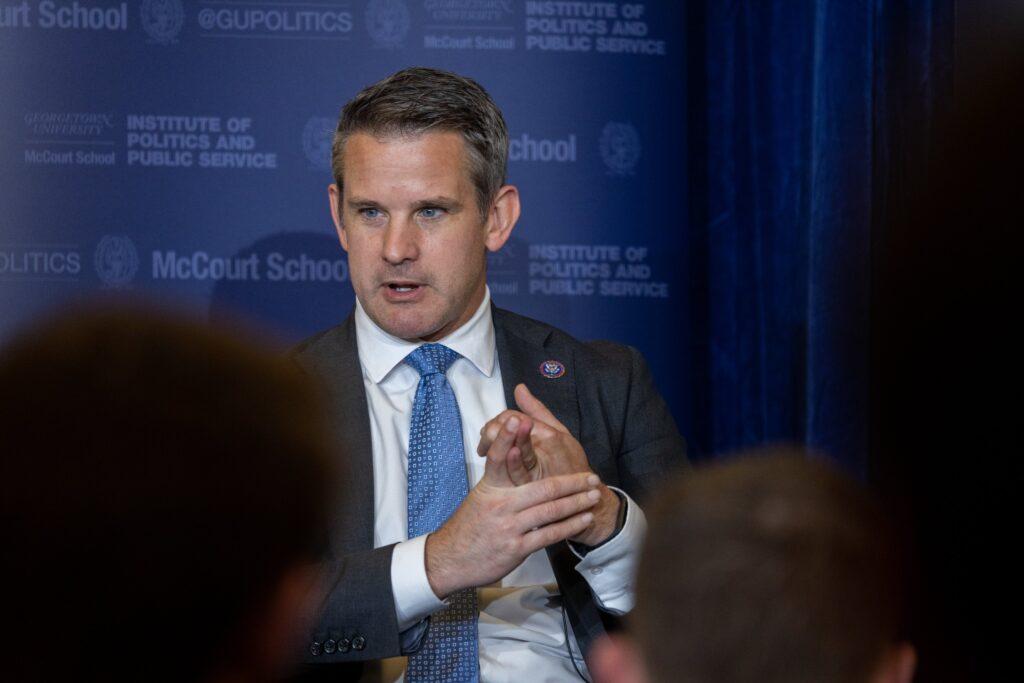The United States political system has become increasingly polarized and requires bipartisan collaboration to best serve U.S. citizens, Representative Adam Kinzinger (R-Ill.) said at an event.
At the April 5 event, “How to Heal: Pushing Through Polarization,” Kinzinger spoke about how fear worsens political polarization and his hope for future generations’ ability to resolve it.
The event was hosted by the Georgetown Institute of Politics and Public Service (GU Politics), the Georgetown College Republicans and the Georgetown Bipartisan Coalition. This event is the first in GU Politics’ new forum series titled “How to Heal: A Series on Pushing Through Polarization,” aiming to bring together political leaders and activists across the political spectrum to discuss the issue of polarization.

Kinzinger said fearmongering has become an increasingly popular tactic used by politicians, which has contributed to the polarization within the U.S. political sphere.
“Members of Congress raise a ton of cash on fear,” Kinzinger said at the event. “If I tell you that I am the one that’s going to protect either Nancy Pelosi or Mitch McConnell from killing your family — it’s almost that bad — in fundraising, you will part with anything, including your money, to prevent that from happening.”
Kinzinger is one of two Republican lawmakers on the House committee investigating the Jan. 6 assault on the U.S. Capitol. He was also one of 10 House Republicans to vote for the impeachment of former President Donald Trump following the insurrection.
Political polarization among Americans has grown rapidly in the last 40 years — faster than the rise of polarization in European and other prominent democracies, according to a January 2020 National Bureau of Economic Research working paper.
Centering humanity can provide a solution for polarization, according to Kinzinger.
“For the most part, in a political setting, people are scared that this country is not going to accept them or leave them behind,” Kinzinger said. “When both people who have very different views recognize and look in each other’s eyes and say ‘your fear is the exact same as mine,’ that disarms everybody and you begin to see things sympathetically.”
Kinzinger said a key part of easing polarization is not for people to abandon their beliefs, but to learn how to coexist.
“It’s important for us to put that message out there to folks and just say ‘demand better.’ When we talk about compromise and common ground, I’m not talking about somebody giving up what they believe and going and becoming moderate or squish or not arguing. Like, keep that, but recognize you live in a society with people that are different than you,” Kinzinger said.
It is up to younger generations to foster bipartisanship within U.S. politics, according to Kinzinger.
“There are too many kinds of old people in politics that are still fighting the same battles they’ve always fought, you know? They’re arguing the same stuff they were arguing in the sixties, right? Same solutions to the same problems. You guys will be the ones that are going to have to fix problems and also change how we deal with each other,” Kinzinger said.
A disproportionate number of American lawmakers represent older generations, with baby boomers making up 53% of the House of Representatives and 68% of the Senate, according to a 2021 Pew Research Center report. Furthermore, the Silent Generation makes up 38 members of congress. There is only one millennial member of the Senate and there are 31 millennial members of the House.
Kinzinger said future generations are capable of taking action against the polarization plaguing U.S. politics.
“Your guys’ generation, I’ve got to tell you, is so interested and engaged in this stuff, and they’re so fed up that we’re not going to see a generation of people that are fed up and say, ‘we’re just not going to pay attention,’” Kinzinger said. “You all are fed up and you’re going to be spurred to action.”





















Kay • Apr 9, 2022 at 11:45 am
Sajaka Shelton: Thanks for this article. It shines light on yet another under represented group within our government. Openly describing & analyzing differnces in any facit of life can be a catalyst for needful change. These opportunities lead to fair representation for any person(s) on U.S. soil. Starting with the superficial (visually seen), analyzing the cause, then implementing an approprately fair solution (run for congressional seat) will yield unarguable result.s.